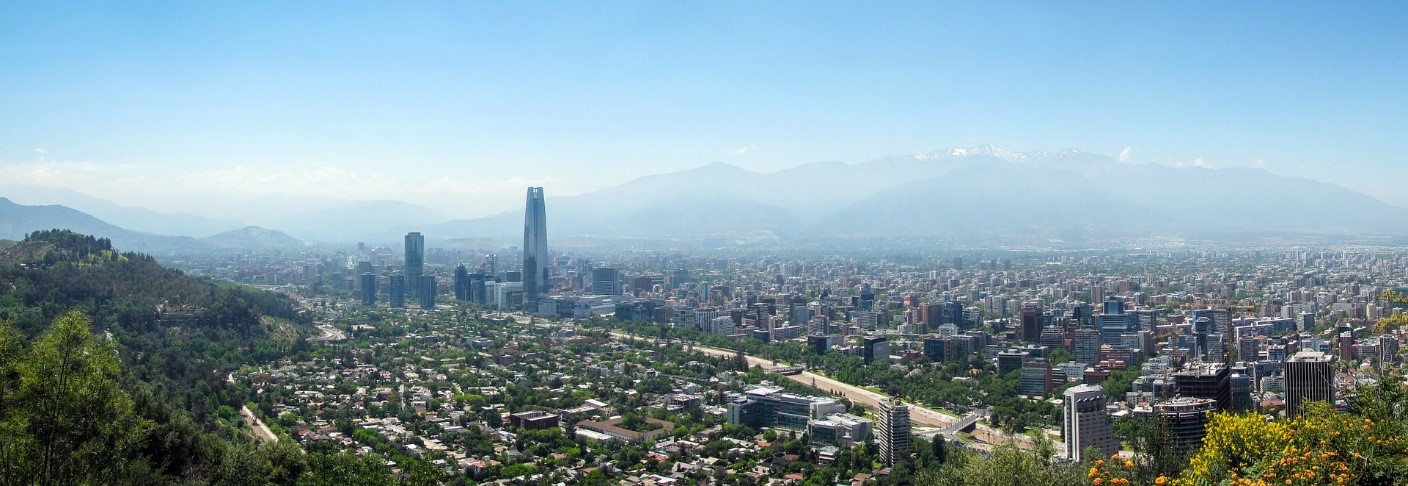Chile: Massive Protests Over Inequality
Protests in Chile over a spike in transportation costs reflect deeper problems with rising economic inequality.
Protests in Chile over a spike in transportation costs reflect deeper problems with rising economic inequality. This article appeared in the November-December 2019 issue of NewsNotes.
On October 6, the Ministry of Transport and Communication in Santiago, Chile, announced a 3.5 percent metro fare hike, bringing the cost to $1.16 per ticket, more than double the price of the fares in Buenos Aires, Argentina or Lima, Peru. Beginning on October 11, students in Chile began protesting the new price by jumping metro turnstiles and taking over stations.
The government’s response to the protests exacerbated the situation. Referencing the protesters, President Sebastián Piñera said that Chile was “at war with a powerful, relentless enemy.” Government officials made tone-deaf comments such as suggesting people simply leave earlier for work to avoid higher prices of rush-hour transportation, which angered the middle class.
The size of the protests grew by the day, with members of the middle class, unions, and other groups joining the students in the streets. Protestors began looting and burning grocery stores and metro stations and vandalized a Cathedral in Valparaíso. For the first time since the dictator Augusto Pinochet left office in 1990, the presidential administration ordered the military into the streets and imposed a nightly curfew.
At least 20 people have died, mostly from the fires set during protests, although five people were killed by security forces. At least 1500 people have been arrested. Former Chilean president and current UN High Commissioner for Human Rights, Michelle Bachelet, has sent a delegation to Chile to investigate human rights abuses related to the arrests, deaths, and injuries of civilians.
The protests are ultimately about general economic inequality and distrust in institutions in Chile, including the Catholic Church in the wake of the abuse scandal. The minimum wage in Chile is $413 a month and the cost of living is high, with prices for food, transportation, healthcare and other living expenses closer to those in the United States. While Chile has the strongest economy in Latin America, it has the highest economic inequality among the countries participating in the Organization for Economic Cooperation and Development (OECD).
These protests are happening just days before finance ministers were scheduled to arrive in Chile for the Summit Asia Pacific Economic Cooperation (APEC) and weeks before Chile was to host the United Nations COP25 climate conference to make further progress on the Paris agreement. On October 30, the Chilean government announced that it would no longer host either the APEC or the COP25 gathering, a last minute decision which has been met with worldwide astonishment.
Both the OECD and APEC are international bodies where nations collaborate on trade and economic policies, particularly free trade and other neoliberal economic policies. Some people point to the neoliberal reforms that started during the dictatorship as one major factor in the rising inequality today. But the economic model established under the dictatorship has continued through both right- and left-leaning presidential administrations.
Chile is currently experiencing an economic slowdown, especially with the decline in copper mining production. Chile is the world’s largest producer of copper and this industry accounts for ten percent of the country’s GDP. When President Piñera came into office in March 2018, he announced plans to instate economic austerity measures to rein in government spending and stem the rising debt related to stagnation in the copper industry. The 2020 budget, revealed on September 27, proposes more belt-tightening measures and the lowest government spending increase in a decade.
This month, protests against economic austerity measures also occurred in Argentina and Ecuador, Chile’s neighboring countries. Ecuador also declared a state of “exception,” or emergency, in response to the protests. Ecuadorean security forces imposed a nightly curfew, used tear gas, rubber bullets and even live bullets on protesters resulting in deaths, injuries and arrests.
Argentina just held a presidential election that acted as a referendum on the austerity measures that were put in place under center-right President Mauricio Macri. Citizens voted against austerity measures in electing center-left candidate Alberto Fernández.
Civil society groups have framed this moment as a social-political crisis not seen since Chile returned to a democracy in 1990. Chilean civil society has called for nonviolent protests, for the government to call off the state of emergency and pull the military from the streets, and for all sides to engage in dialogue to create a new social compact. Following a protest by over one million people in the streets of Santiago on October 25, President Piñera asked his entire cabinet to step down and called off the state of emergency. He also proposed increases to the minimum wage and pensions. For some protesters, these measures are not enough. It is still unclear how these tensions will be resolved.
Image of Santiago by soyfigarella, Pixabay

